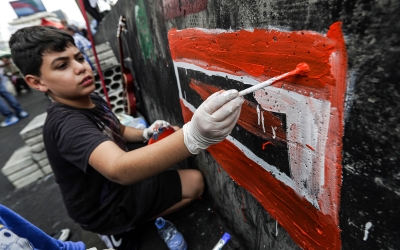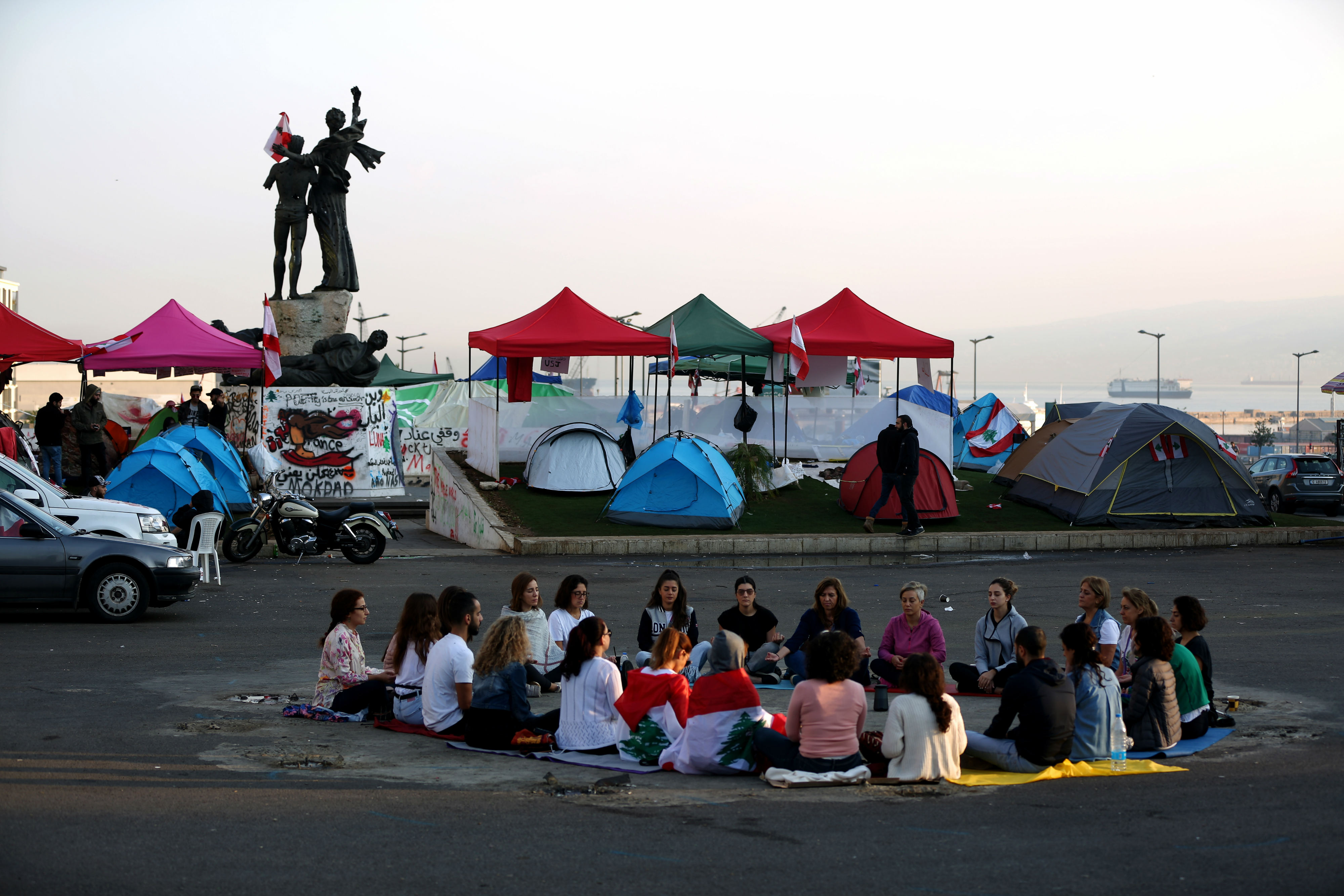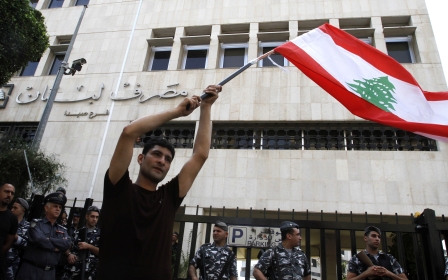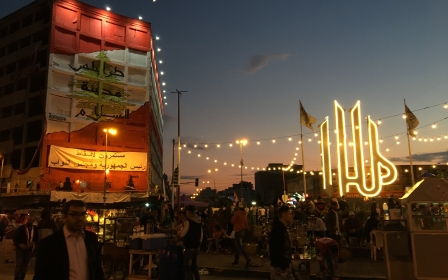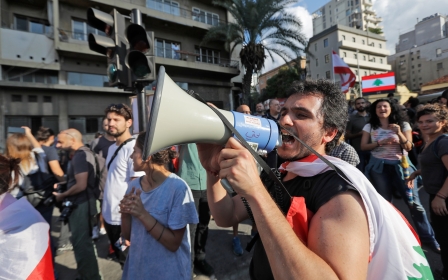In Beirut's protests, Lebanese use debate and dialogue to plot next course
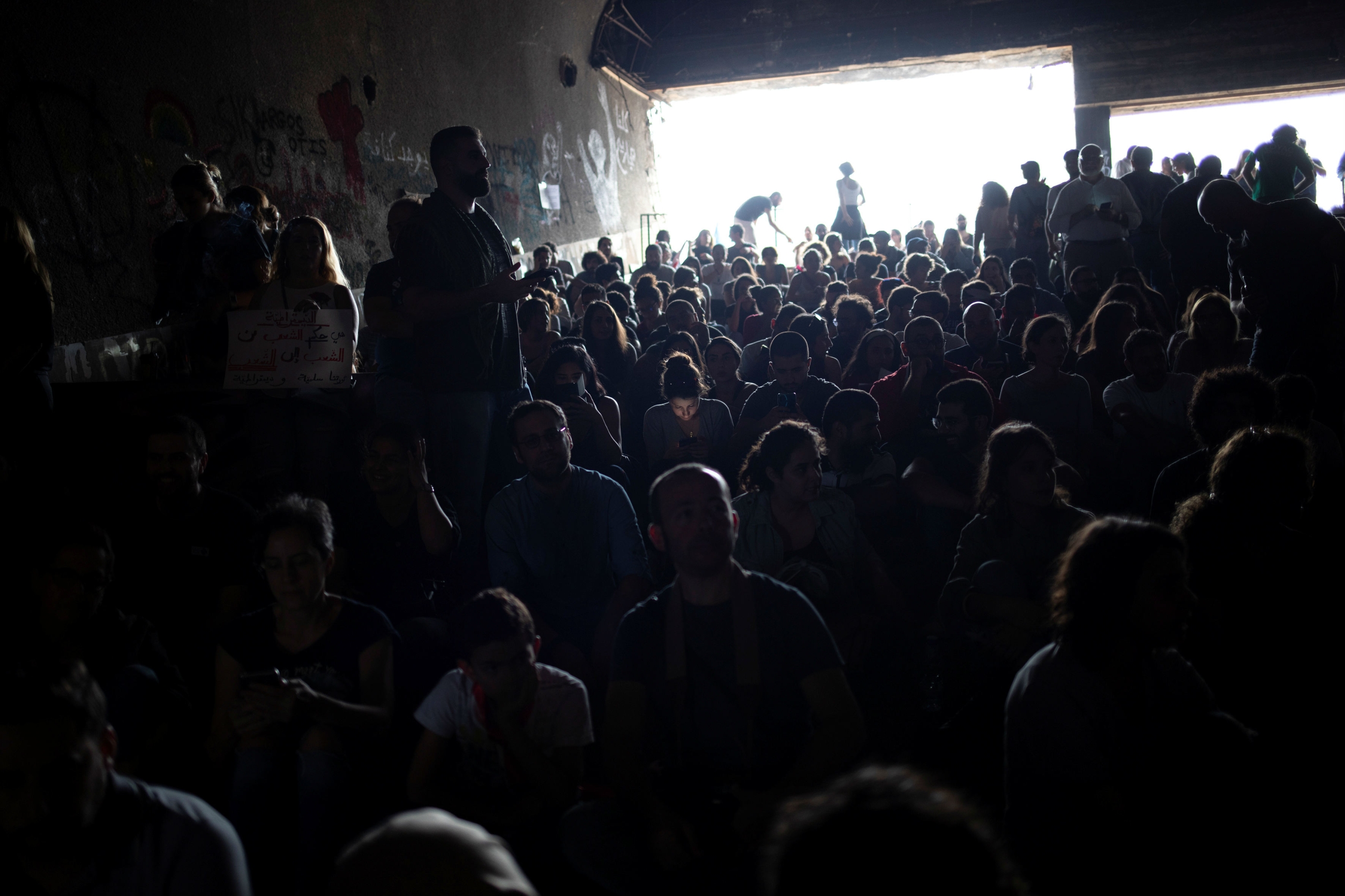
Only three weeks ago, Beirut’s manicured Downtown was a sterile landmark, levelled by a high-end reconstruction project that wiped out much of the neighbourhood’s remaining heritage after a 15-year-long civil war came to an end in 1990.
The multibillion-dollar programme that razed the hotels, restaurants and cafes that used to carry the bustling daytime activity over into the evening transformed Beirut’s centre into a quasi-deserted cluster of pristine streets, dominated by a car park and dotted with banks, upscale tower blocks and nodding cranes that prelude to more construction to come.
'Awareness sessions are part of the revolution'
- Josephine Zoughaib, 40
But a popular uprising that began on 17 October has given a new purpose to Beirut’s forlorn central district.
Every evening, as the sun disappears behind the minarets of the gargantuan Mohammad al-Amin Mosque, flag-wielding Lebanese pour into the graffitied city centre to blast anti-establishment slogans out of speakers, share a free meal and, most importantly, discuss their country’s future.
“I come here every night to listen,” Josephine Zoughaib, 40, tells Middle East Eye after attending a debate on the overbearing influence that corruption has played on Lebanon’s history and how to move past it.
New MEE newsletter: Jerusalem Dispatch
Sign up to get the latest insights and analysis on Israel-Palestine, alongside Turkey Unpacked and other MEE newsletters
“Awareness sessions are part of the revolution.”
Willingness and energy
Across the country hundreds of thousands of Lebanese have been calling for the removal of all its ineffectual leaders and the rooting out of corruption that has blighted the country for decades.
So far, they have forced the government’s resignation. But the next steps are unclear, as politicians consult on the formation of a temporary government to tide things over until a future election.
Political consultations are no longer limited to Lebanon’s leaders, however, as protesters begin to plot their next course.
In one of the tents erected to accommodate the crowds, anti-corruption expert and consultant Arkan El-Seblani argues that a new electoral law is not the cure for all of Lebanon’s ailments.
“If we don’t have the willingness and the energy to do the tedious work that is building institutions - building a state - but only want high-sounding manoeuvres, then we’re not going to go anywhere,” he says.
“There are countries in which there are [free] elections and there is corruption, so there is no automatic correlation.”
Jerking his hand up, an attendee called Hanna requests the floor to speak.
“We need independent judges and to build institutions that are separate from the state,” he says. “The president of the republic can’t be responsible for the corruption files - the minister of justice had years to work on this and we saw nothing.”
The walk down the length of Martyrs’ Square, from the bullet hole-pocked concrete building known as "the Egg" to Beirut’s waterfront, offers a tour of the country’s afflictions, as well as its resilience.
In a nearby tent, a group discusses the ever-looming spectre of sectarian violence, and how to prevent a flare-up similar to the one that engulfed the country into a civil war in 1975.
Asaad Chaftari, who served as a senior intelligence official in a wartime Christian militia, warns against falling back into the logic of sectarianism.
“If Lebanon really matters to us, we must live as one. We haven’t learned how to live together yet,” he says. “Go to your neighbour’s house and see how he lives… social justice is not something you acquire, it’s something you give others too.”
Haydar Amarchand, a 70-year-old woodworker and a leftist militant in the multifaceted civil war, says these words resonated with him.
“What we lived in 1975 must never happen again,” he tells MEE. “It is very important that we talk about it because we are not used to dialogue… we are used to killings, violence, fighting, not dialogue.”
'Nothing will be the same'
History is still a taboo subject in the Lebanese education system. Textbooks offer different narratives according to the students’ sect and whether the school is public or private.
At times, the topic is dodged entirely and teachers do not move past 13 April, 1975, when Kataeb party militiamen massacred Palestinians on a bus and tensions between Muslims and Christians unravelled into war.
Yet, history is visible in every corner.
The Statue of the Martyrs, which dominates Beirut’s eponymous square, is riddled with bullet holes, as are a few nearby buildings that survived the reconstruction frenzy led by Solidere, a joint-stock company affiliated to the billionaire family of resigned Prime Minister Saad Hariri.
Renamed in memory of the Lebanese nationalists who were executed by the Turks during World War 1, Martyrs’ Square is now home to a few dozen camped out protesters who are determined not to budge out until their demands for a non-sectarian state are met.
The perimeter that surrounds the monument, as well as the base upon which it rests, have become canvasses on which to express the nation’s scorn for the political class and its need for change.
On Wednesday night, a round mural depicting a woman’s glaring face and the slogan “the revolution is female” appeared on the ground facing Mohammad al-Amin mosque. Rola Abdo, the visual artist behind its design, said she was inspired by the role played by women in the uprising.
“We have seen how fearless women are and how hopeful they are for change, and I wanted to honour all of them,” Abdo tells MEE.
'We all have different opinions but at least we are talking, that’s the big difference'
- Zoughaib, protester
In Lebanon, women constitute 51 percent of the population but occupy 5 percent of parliamentary-level positions. Legally, they do not have the right to pass on the citizenship to their offspring and are often discriminated against in divorce and inheritance matters, among others.
Women have gathered around the mural to sing the national anthem. Significantly, they have introduced the word “women” into the lyrics, which only reference “stalwart men”.
A march organised by women's rights groups on Sunday went as far as broaching the subject of abortion - still largely taboo in Lebanon - and hailing it as one of their rights.
Zoughaib, who joined the women’s ranks at the mural after attending the debate on corruption, expressed the common belief in the streets of Beirut that things have gone too far to go back to the way they were.
“We all have different opinions but at least we are talking, that’s the big difference,” she says.
“Even if the revolution stops now, nothing will be the same again.”
Middle East Eye delivers independent and unrivalled coverage and analysis of the Middle East, North Africa and beyond. To learn more about republishing this content and the associated fees, please fill out this form. More about MEE can be found here.


